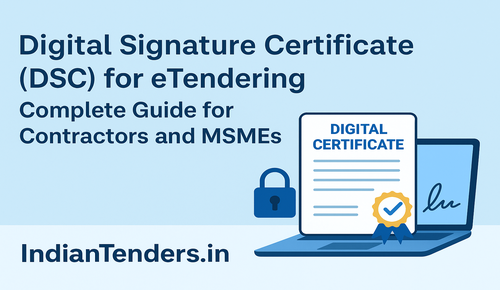What is a Digital Signature Certificate (DSC)?
Introduction:
In today’s digital procurement landscape, every contractor, supplier, and MSME participating in government tenders must possess a valid Digital Signature Certificate (DSC). Whether you are bidding through the Maharashtra eProcurement Portal, GeM, or Central Public Procurement Portal (CPPP), a DSC is mandatory for authentication, bid signing, and submission.This guide explains everything contractors need to know - from what a DSC is, how to obtain one, its legal standing under Indian law, and how IndianTenders.in helps streamline the process.
What is a Digital Signature Certificate (DSC)?
A Digital Signature Certificate (DSC) is the electronic equivalent of a physical signature used to validate identity and ensure the authenticity of electronic documents. Just as a passport or driving license confirms your identity in the physical world, a DSC serves as your secure digital identity in the online procurement ecosystem.It is stored in a secure USB token and used to sign tender documents, forms, and contracts electronically - making your eTender submission legally valid and tamper-proof.
Why Contractors and MSMEs Need a DSC for eTendering
In India, all major government departments, PSUs, and state procurement systems mandate DSCs for online tender participation.A DSC helps:
• Verify the identity of the bidder
• Ensure bid integrity and authenticity
• Prevent unauthorized access or data manipulation
• Legally validate documents submitted online
Without a DSC, no bidder can submit an electronic tender - making it a fundamental requirement for contractors and MSMEs entering eProcurement platforms.
Legal Framework: IT Act, 2000 and Section 24
Digital Signatures are legally recognised under the Information Technology Act, 2000.As per Section 24, only licensed Certifying Authorities (CAs) authorised by the Controller of Certifying Authorities (CCA), Government of India, can issue DSCs.
Once issued, a DSC carries full legal validity and can be produced in a court of law as admissible evidence, just like a handwritten signature.
Types and Classes of Digital Signature Certificates
There are three primary classes of DSCs in India: • Class 1 DSC: Basic identification, generally not used for eTendering.
• Class 2 DSC: Used for business registration or form filing. (Phased out in many cases)
• Class 3 DSC: Mandatory for eTendering and eProcurement. It provides the highest level of assurance and requires physical verification by a Registration Authority (RA).
For tender submission, always ensure you obtain a Class 3 DSC from an authorised provider such as eMudhra, GNFC, Sify, or TCS.
How to Obtain a DSC: Step-by-Step Guide
1. Select a Licensed Certifying Authority (CA): Choose from approved CAs listed on the CCA website.
2. Choose Your Certificate Type: For eTendering, select Class 3 - Individual or Organisation type.
3. Submit KYC Documents: PAN, Aadhaar, GST (for firms), and proof of business.
4. Complete Identity Verification: Physical or video verification may be required.
5. Receive Your DSC Token: The e-token (USB) stores your digital key for signing tenders.
6. Install and Configure: Use the CA-provided software to integrate DSC with eProcurement portals.
IndianTenders Tip: Contractors often face delays due to incomplete documentation or token configuration issues. IndianTenders.in assists bidders in obtaining and activating DSCs quickly, ensuring smooth tender participation.
Validity, Cost, and Renewal
• Validity: Usually 1 or 2 years• Cost: Between ₹2,000 to ₹3,000 depending on the provider and duration
• Renewal: DSC can be renewed before expiry through the same CA by submitting updated documents
IndianTenders.in also helps contractors track DSC expiry and renew on time to avoid tender disruptions.
Common Mistakes to Avoid
• Using expired or incorrect DSC class• Mapping one DSC to multiple accounts
• Submitting bids without freezing after digital signing
• Ignoring browser configuration or driver installation errors
Our experts help contractors troubleshoot these issues before bid deadlines.
How IndianTenders.in Helps You with DSC and eTendering
At IndianTenders.in, we don’t just provide tender information - we guide you through every step of eProcurement participation.Our services include:
- Assistance in obtaining Class 3 DSCs from authorized providers
- Support in DSC installation, mapping, and renewal
- Guidance for Maharashtra eProcurement, GeM, and CPPP platforms
- Personalized support for MSMEs and first-time bidders
With IndianTenders.in, you stay compliant, secure, and ready to submit your bids on time.
Conclusion
Digital Signature Certificates form the backbone of India’s secure eTendering ecosystem. They not only verify bidder identity but also ensure legal and data integrity across all transactions.
For every MSME and contractor aiming to expand through government projects, having a valid Class 3 DSC is the first step toward seamless participation.
At IndianTenders.in, we make the DSC registration and renewal process simple, quick, and reliable - so you can focus on winning tenders, not paperwork.
